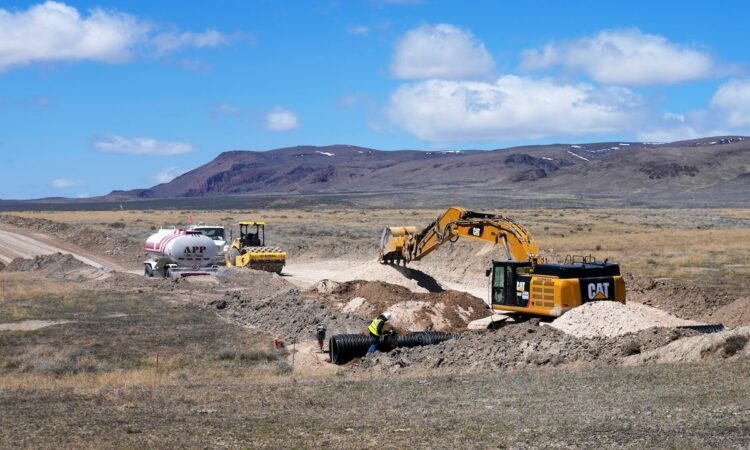Trump’s investments in Canadian critical minerals could push Ottawa to follow suit, industry players say

Construction at Lithium Americas’ Thacker Pass lithium mine near Orovada, Nev., in 2023. President Donald Trump recently announced that the U.S. is taking an equity stake in the Vancouver-based firm.Rick Bowmer/The Associated Press
U.S. President Donald Trump’s increasing interventionist push into the Canadian critical-minerals sector may propel Ottawa to follow suit, but some industry players are cautioning the federal government to tread carefully.
In the past few weeks, the Trump administration announced it had taken equity stakes in two Canadian critical-minerals companies, Lithium Americas Corp. LAC-T and Trilogy Metals Inc. TMQ-T. The U.S. government secured highly favourable terms in both transactions, with millions in virtually free warrants being issued, and a board seat in the case of Trilogy.
The development comes amid a broader push by the Trump administration for increased state ownership of private industry for projects the White House deems critical to the country’s national security. The U.S. government has also recently taken equity positions in chip maker Intel Corp. INTC-Q and rare-earths company MP Materials Corp. MP-N
Opinion: Washington buying stakes in Canadian miners creates national-security dilemma for Ottawa
Canada needs a critical minerals strategy that actually works
Subrata Bhattacharjee, partner and national chair of the competition and foreign investment review group with Borden Ladner Gervais LLP, said it could be difficult for Canada to sit on the sidelines and not consider following suit in some fashion.
“We are in this new world of increased state intervention directly in companies, in markets, to protect strategic interests,” he said. “It would not be surprising for the Canadian government to be looking at this stuff.”
Ottawa, in fact, has taken baby steps in equity deals in the critical-minerals sector in recent years through Canada Growth Fund Inc., a $15-billion public investment vehicle launched in 2023 that operates at arm’s length from the government.
In 2024, CGF paid $35.6-million for almost 20 million shares in Quebec graphite development company Nouveau Monde Graphite Inc. NOU-T, and this year it acquired a $156-million equity stake in Foran Mining Corp. FOM-T, a Saskatchewan-based copper development company.
Unlike the recent Trump administration transactions, CGF deals have been done at terms that are far closer to market rates, and in conjunction with private-sector stakeholders.
Yannick Beaudoin, chief executive officer of Canada Growth Fund Investment Management Inc., said in an e-mail that CGF is “pleased to bring its investor’s lens to unlock Canadian projects, support economic growth, and strengthen critical minerals supply chains for Canada, its allies, and its trading partners.”
Rather than equity deals, the bulk of government funding for the Canadian resource sector has tended to be either through grants or low-interest loans, and the amounts have run the gamut. Ottawa in August provided a $6.2-million loan to Northern Graphite Corp. NGC-X, allowing it to keep its Quebec graphite mine in operation. Last month, it provided a $400-million loan to Algoma Steel Group Inc. ASTL-T to help it survive the trade war.
The Globe and Mail asked Natural Resources Minister Tim Hodgson whether Ottawa plans to take more equity stakes in companies and at more aggressive terms, similar to Mr. Trump’s actions.
“The Government of Canada continues to assess its economic tool kit to ensure its supports for critical minerals projects and companies are fit for purpose, recognizing geopolitical developments and emerging trends in global investment landscapes,” Carolyn Svonkin, spokesperson for Mr. Hodgson, replied in an e-mail.
The idea of Canada demanding sweetheart equity deals isn’t going down well with the mining industry, Heather Exner-Pirot, director of energy, natural resources and environment at the Macdonald-Laurier Institute in Ottawa, said in an interview.
Government and private industry invariably have different goals that are difficult to reconcile, she said. While a company’s primary responsibility is to shareholders, governments’ objectives are political. There is also an inherent conflict of interest in having Ottawa as a shareholder because it has the power to grant or deny permits, which can make or break a company.
“When I’ve talked to mining companies, it is not their preference to have government equity,” she said. “That very much adds complications to the governance, to your ability to attract different investors, to sell in different markets, and you just have this political layer that is unattractive for mining companies.”
On regulation, she added, “You can’t regulate a project that you have an economic interest in, that violates basic fundamental principles of good governance and fairness.”
Martin Turenne, CEO of FPX Nickel Corp. FPX-X, said the most helpful funding tool for the junior mining sector would be widening the eligibility for the issuance of flow-through shares. He said they can lower the cost of capital by up to 50 per cent. Currently, flow-through shares can only be issued if the proceeds are used to fund mining exploration and development. While government grants and loans only benefit a few players, broader access could help the entire industry.
“It’s a market-based mechanism, because it’s not the government of Canada deploying its own capital, or choosing winners,” Mr. Turenne said. “It’s something that’s applicable to all projects, and then all companies compete on the basis of that.”




